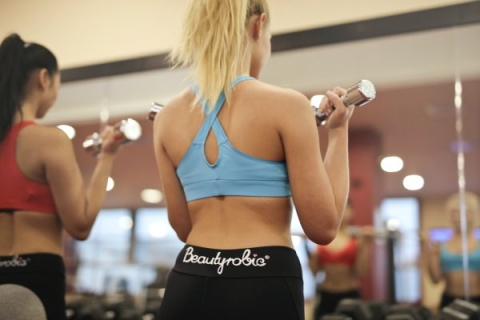
More than 100 British elite female athletes from Olympic and Paralympic sports are set to be given bespoke bras, after research found breast pain sometimes stopped them from giving 100 per cent.
The English Institute of Sport (EIS), University of Portsmouth and Clover Group have offered UK Olympic and Paralympic athletes the chance to be fitted with sports bras, developed by Clover, to help improve both their health and performance.
The three parties joined forces after an initial survey* revealed three quarters of elite female GB athletes across a range of sports had never been fitted for a sports bra, and 26 per cent reported that breast pain affected their ability to give their all in training or competition.
I was surprised and worried that elite female athletes were experiencing breast pain and I’m glad that we are now working with them, because this is something that can almost always be fixed with a well fitted bra.
Professor Joanna Wakefield Scurr, Professor in Biomechanics and Head of the Research Group in Breast Health
Co-Lead of Female Athlete Health and Performance at the EIS Dr Anita Biswas said: “As part of our support of female athletes, we wanted to consider all aspects of female health that could potentially impact on performance. Working with researchers at the University of Portsmouth, we have been fitting athletes with the right type of bra, because often athletes will be wearing the right size, but it might not be the right type of bra for their particular activity.”
The athletes, who have been fitted for bespoke bras, as well as receiving advice and guidance on breast health, represent GB in 15 different sporting disciplines.
Professor Joanna Wakefield-Scurr leads the Research Group in Breast Health at the University of Portsmouth. Her team is world leading in its work with lingerie manufacturers, the NHS, the military and sportswomen to protect breast health and help reduce or eliminate breast pain.
She said: “I was surprised and worried that elite female athletes were experiencing breast pain and I’m glad that we are now working with them, because this is something that can almost always be fixed with a well fitted bra.

The researchers found many of the elite athletes were wearing a bra, but often not the right bra for their sporting activity
“One of our key objectives is to raise awareness in this area. Wearing appropriate support can improve your performance and technique, but in addition to that, if you don’t wear appropriate support, you are at risk of causing damage to the delicate supporting structure of the breast.
“Research also shows that wearing appropriate support can reduce or often eliminate breast pain. The final negative consequence that we talk about a lot is the psychological effect, so the fact that breast movement can be a barrier, it can change the type of activity that women will do, or the clothes they will wear so that their breast bounce doesn’t show.”
GB Hockey player Hannah Martin is one of the athletes who will be receiving a bra.
She said: “Everyone feeling comfortable out there on the pitch and in themselves is incredibly important, both as a female in general, but also as a female in sport.
“It will just allow us when we’re competing to not think about it, when you’re in those pressured environments, you don’t want to be thinking about anything else, so it will be really good to take your mind off it.
“Growing up, it isn’t really something that is talked about, you just find one and put it on, but it’s such a huge part of health and performance, so it should definitely be talked about more with education around what you need and what is right for you.”
Of the women tested, nearly all (94 per cent) wore a sports bra, but most (75 per cent) had never had a bra properly fitted.
The athletes’ breasts ranged in size from 32-44 inches, and cup sizes AA-J.
One of the athletes wears a sports bra with sports tape over the top to help add more support.
The Research and Development Department of Clover Group is led by Sigi Rabinowicz. He said Clover’s R&D team was “extremely excited” to see the potential benefits that appropriate bespoke sports bras could offer these athletes.
*70 elite athletes were surveyed by the University of Portsmouth and the EIS after voluntarily taking part in this project.

Professor Joanna Wakefield Scurr's team works with lingerie manufacturers, the NHS, the military and sportswomen to protect breast health and help reduce or eliminate breast pain
